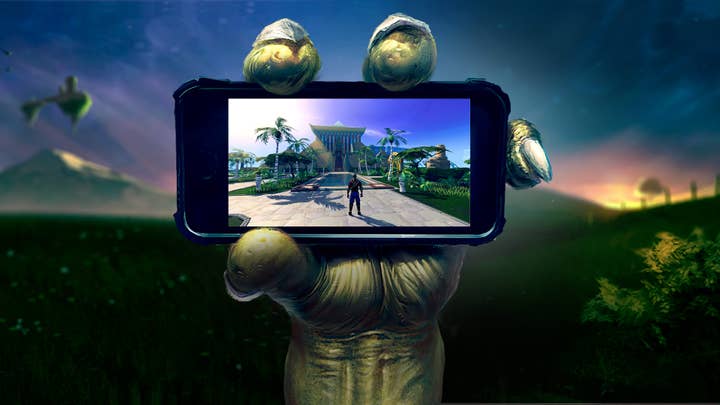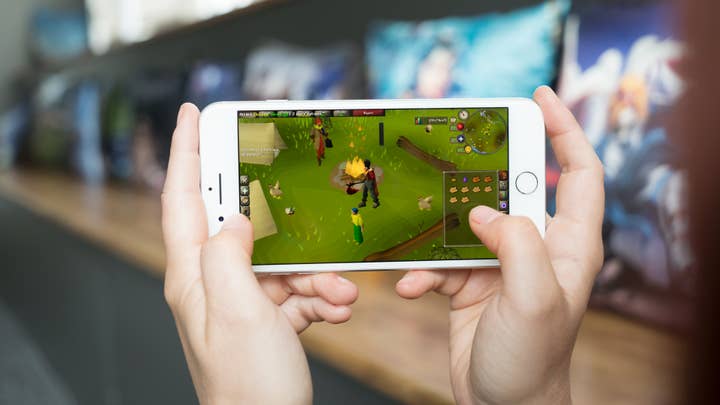Jagex: RuneScape on mobile will make the MMO a "second-screen experience"
New cross-platform, interoperable mobile editions aim to recapture lapsed players and draw in new audience
UK developer Jagex has announced a major push into the mobile space by bringing both versions of its flagship MMO RuneScape to smart devices.
Old School RuneScape, a retro-style affair based on older builds of the online RPG, will be released for smartphones and tablets this winter, with the more modern version of RuneScape to follow at a later date.
These are not separate mobile ports, either. Both games will allow cross-platform play with their PC counterparts and will even be interoperable, meaning players can log off from one device and instantly pick up the action on another.

We caught up with Jagex's director of communications Rich Eddy to find out more about the studio's strategy and how it is preparing to enter the increasingly competitive mobile marketplace.
"We want to take RuneScape to where people are playing, whether that's in its current MMORPG form or a spin-off franchise - that's something you'll see in the future," he tells GamesIndustry.biz. "Going onto new devices for new territories is one of the key things we're pushing towards at the moment.
"The first logical approach is to take the title to mobile because our players have grown up. RuneScape has been around for 16 years. People have different amounts of time than they did [16 years ago], and different ways of playing. Some people who were PC players are not now, but we can offer that same experience on a mobile device that people can dive in and out of. It's about making an MMO a second-screen experience."
Of course, while the original RuneScape was one of the earliest browser-based MMOs, when it comes to mobile the game is spectacularly late to the party. Companies have been delivering massively multiplayer experiences on smart devices for years, with some mobile titles even approaching the scale of World of Warcraft. However, few of these games have had a significant impact, instead overshadowed by more accessible multiplayer outings like Clash of Clans. How then can Jagex expect to see success from a 16-year-old game?
"We can offer that same experience on a mobile device that people can dive in and out of. It's about making an MMO a second-screen experience"
Eddy remains confident that the "heritage and the brand power that really comes with RuneScape" puts the company in a stronger position than previous mobile MMO developers, adding: "In the crowded mobile marketplace, a brand's heritage, value and a recognisable name are incredibly important touchpoints when it comes to getting people to download your app."
He stresses that mobile RuneScape is initially aimed at established and lapsed players, and in those the firm already has a dedicated audience. The average RuneScape player has been engaged with the game for six years, and many have been around for more than a decade. With 250m registered accounts, Eddy hopes the release of Old School on smart devices will "jog people's memories" and become a "dip back in experience."
"Old School is very 2007 in its technology and its visuals, and that isn't going to resonate with everyone," Eddy admits. "But it does have its brand and value, as well as an awful lot of players and ex-players that it will work for.
"When we come to RuneScape - the current, more modern and new engine version of the game - that will be the more familiar-looking mobile game to new players, with the glorious visuals, the high-tech, the spinning camera and the present day expectation of an adventurous game."

We spoke to the RuneScape firm earlier this year about what they're proudly declaring "the Third Age of Jagex" - a term Eddy also drops into our conversation. It's not just a PR line, as the company is undergoing a significant transformation following its acquisition last year by Zhongji Holding. With fresh Eastern investment in the long-running MMO, is the push to mobile designed in part to appeal to the Chinese market? Eddy says that's not the case, but the home nation of Jagex's new owners has at least validated the British studio's strategy somewhat.
"We haven't looked at the Chinese model and thought 'we should do this' - it was something that was happening anyway, out of pure belief and player research"
Rich Eddy, Jagex
"PC and mobile in China are actually more connected as two formats than they are here," he explains. "Cross-platform play is very big over there, interoperable play is a thing over there. It shows us that there is an existing appetite and PC players aren't sniffing at a mobile version - primarily because it is a full PC experience on a mobile, and that's what they like. Anecdotally, you tend to hear more bad things about mobile games coming to PC. But if people can be guaranteed that PC experience on their mobile, they're much more accepting."
While there's proof RuneScape's ambitious new model works in China, there's no guarantee it will be as effective in markets closer to home. The East/West divide is still very much apparent when it comes to games, with countless examples of success stories that have failed to transfer from one side to the other.
However, Eddy stresses again that this is not some attempt to recreate what has fared well in China: "It's more of a trend in terms of matching the PC experience on mobile, not offering a watered down mobile experience. It's a mirror, an exact mirror. We've seen that as a trend.
"We haven't looked at the Chinese model and thought 'we should do this' - it was something that was happening anyway, out of pure belief and our own player research. Phil [Mansell, COO] has talked about our player research, which is obviously Western folk. 90% of existing players were interested in playing RuneScape on mobile. 65% of lapsed players said they would return to RuneScape if we delievered that game for them on mobile. Because they were playing as teenagers and they dropped it when they got jobs, families and other stuff. But if we can give them something they can play on their iPads when they've got their feet up at night while they've got something on the TV and it becomes their second-screen experience... there's an appetite for that."
Of course, Jagex still has plans for the Chinese audience. Even without the advantages of a parent based in the region, it would be foolish not to target the world's largest games market.
"You will see RuneScape appearing on many different devices and in different ways going forward, and in different territories," says Eddy. "Now we're part of a Chinese company, there are explorations into what a RuneScape made for China looks like.
"We're recruiting hard and heavy at the moment [because of our] ambition to build new product. There's new product creation going on at Jagex for everything from experimental stuff to big, long-term investment development projects that will develop into something beyond RuneScape."
To bring in the skills needed to guide Jagex through these uncharted waters, the studio has welcomed back Peter Lovell as director of talent acquisition. Speaking to GamesIndustry.biz, Lovell says the two years he spent working for Zynga-owned NaturalMotion have put the company in good stead to entice those with mobile expertise.
"We've developed a good network of the people we need to be interfacing with," he says. "I know what good looks like and I want to bring that muscle memory and my industry connections back into Jagex, to really get out there and tell people we're a credible, well-funded, really exciting prospect. It's all about getting the message out there to the wider mobile talent pool."
"We're going into a difficult field where the best people are being recruited by every mobile company out there."
Peter Lovell, Jagex
He goes on to say that the shift towards mobile requires a markedly different recruitment strategy that Jagex has previously employed. It also brings the developer into competition with the likes of Supercell, Rovio, Gram Games and King when it comes to fighting over the best hires - a challenge he is embracing with gusto.
"A lot of our recruitment was driven by going out and finding graduates, bringing them up and developing them," Lovell explains. "This particular mobile talent drive is slightly different - there aren't as many opportunities to bring fresh people into it.
"We're very much going to have to rely on a personal, headhunting message and approach, engaging with people using long-term recruitment 'courting rituals' rather than a 'post and hope' recruiting drive. We're going to have to build out our recruiting function into this bigger global drive into a difficult field where the best people are being recruited by every mobile company out there. We have to make sure our offering as a company is beyond competitive. It'll be cool to go out there and get that talent pool excited about Jagex, which might not be a company they thought of as a player in this particular field."

Mobile players, even casual ones, have become accustomed to regular incentives to keep engaging with their game of choice, whether that's in-game events or monthly waves of new content. Jagex has long since proved itself in this regard, with new additions made to RuneScpe every week - and all steered by its players.
"The RuneScape model of content delivery already fits so well in the mobile market," says Eddy. "It is a constant case of 'what's happening this week?'
"We work so closely with our community - and I know a lot of developers say they do that, but Jagex takes it one step further. Our content developers have to pitch their content and ideas to the community. Unless a majority in excess of 70% votes for it, content doesn't go into the game. There's a constant dialogue between our content creators and the players."
One can only imagine the technical challenges involved in not only getting a PC-based MMO experience up and running on smart devices, but also interacting with the other platform. But Eddy says that readying the initial release has in some ways been easier than you might expect.
"The great thing about Old School - and maybe this is some futuristic insight when it was first developed - is it's perfectly suited for touch screens because it's a point-and-click game, with fixed camera points and everything," he says. "It works almost immediately as a game on mobile. Getting that UI right is obviously essential to hooking in the mobile players - that's probably as much of a focus as the technicality of getting the client on mobile as an app."
Eddy also reports the RuneScape team has found no issue with adding new content that runs on both mobile and PC, meaning the MMO's future remains unrestricted.
"There have been no red flags, no 'we can't do this anymore'," he says. "This summer, we added an entire new city to the game - that already works on the mobile prototype. There's no limit to game design concepts. Everything that can be done for RuneScape PC can be carried over to mobile."
